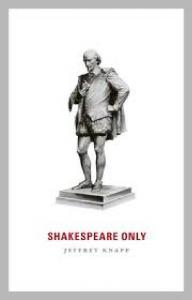Berkeley Books: "Shakespeare Only" by Jeffrey Knapp

If three decades of Shakespeare scholarship can be summed up with the question: “Was Shakespeare one of a kind?” this month’s Berkeley Books selection, Shakespeare Only by Chancellor’s Professor of English Jeffrey Knapp, offers a refreshing alternative to the two poles around which answers have coalesced. On the one hand, “bardolatrists,” represented most vociferously by Howard Bloom, Sterling Professor of the Humanities at Yale, insist on Shakespeare’s singularity. On the other hand, historicists understand Shakespeare’s greatness as a post facto construction that ultimately obscures the collaborative nature of Renaissance drama. In Shakespeare Only, Knapp asks why these individualizing and institutionalizing perspectives on Shakespeare have come to oppose each other so resolutely, and proposes that the two positions can and should be combined: that the uniqueness of Shakespeare must be understood in a historicized context.
Knapp begins by inserting this guiding question of contemporary scholarship into its historical context, asking whether Shakespeare was, in his own view and that of his contemporaries, one of a kind. Pursuing a historiographical analysis of Shakespeare’s dramatic authorship, Knapp asks and answers three sets of questions: “How was dramatic authorship actually conceived during the Renaissance? How did Shakespeare’s contemporaries, and Shakespeare himself, understand his authorship in particular? Most important, how did the authorial paradigms of Shakespeare and his contemporaries shape his plays?” (19). Julia Reinhard Lupton, Professor of English and Comparative Literature at UC Irvine, describes Knapp's rigorous engagement with these questions: “With erudition, tact, and the deepest sympathy for both the poetry and the praxis of England’s greatest playwright, Knapp delivers us a Shakespeare whose experiments with different authorial models, including collaborative ones, helped shape the form and pressure of his plays.”
Shakespeare Only is organized not according to the chronology of Shakespeare’s writings, but rather the relative openness in deliberations of authorship. It is divided into two parts: the first two chapters focus on texts that deal directly with the question of authorship and incorporate the figure of the author into their narratives: the sonnets and Hamlet. The second two chapters study texts in which the figure of the author seems less consequential:Pericles and Two Noble Kinsmen. Though invoked and even embodied on the stage, the author or authors in these plays are confined to prologues and epilogues; nonetheless Knapp shows that authorship remains a central concern.
Richard Halpern, Sir William Osler Professor of English at Johns Hopkins, writes that the book “argues persuasively that the single-author paradigm established itself in the theater earlier and more forcefully than has been thought. Knapp shows that the much-maligned ‘author-function’ plays a vital role not only in the production of Renaissance drama but in the plots of the plays themselves, where themes of death, resurrection, and inheritance frequently allegorize the vicissitudes of authorship. This is a sharply-argued intervention in current critical debates.” As Halpern’s praise suggests, Shakespeare Only represents a critical addition not only to the field of Renaissance drama, but also to broader debates in literary studies about the contemporary return of the author, almost a half-century after Roland Barthes and Michel Foucault’s influential essays “The Death of the Author” (1968) and “What is an Author” (1969) radically challenged the author-function.
In this week’s Biblio-file, Knapp--a recipient of Guggenheim and NEH fellowships, as well as a Berkeley Distinguished Teaching Award--recommends nine books that shaped his thinking while working on Shakespeare Only and embarking on his next project, which will compare plays of Renaissance London to the movies of Golden-Age Hollywood in order to question the dominant view of mass entertainment as a distinctively modern phenomenon. Knapp’s Biblio-file selections range from seminal Shakespeare studies like Stephen Greenblatt’s Will in the World and Lukas Erne’s Shakespeare as Literary Dramatist, to theoretical reflections on art like Noel Carroll’s A Philosophy of Mass Art and Walter Benjamin’s “The Work of Art in the Age of Its Technological Reproducibility,” to the 1933 film Footlight Parade, directed by Lloyd Bacon and choreographed by Busby Berkeley.